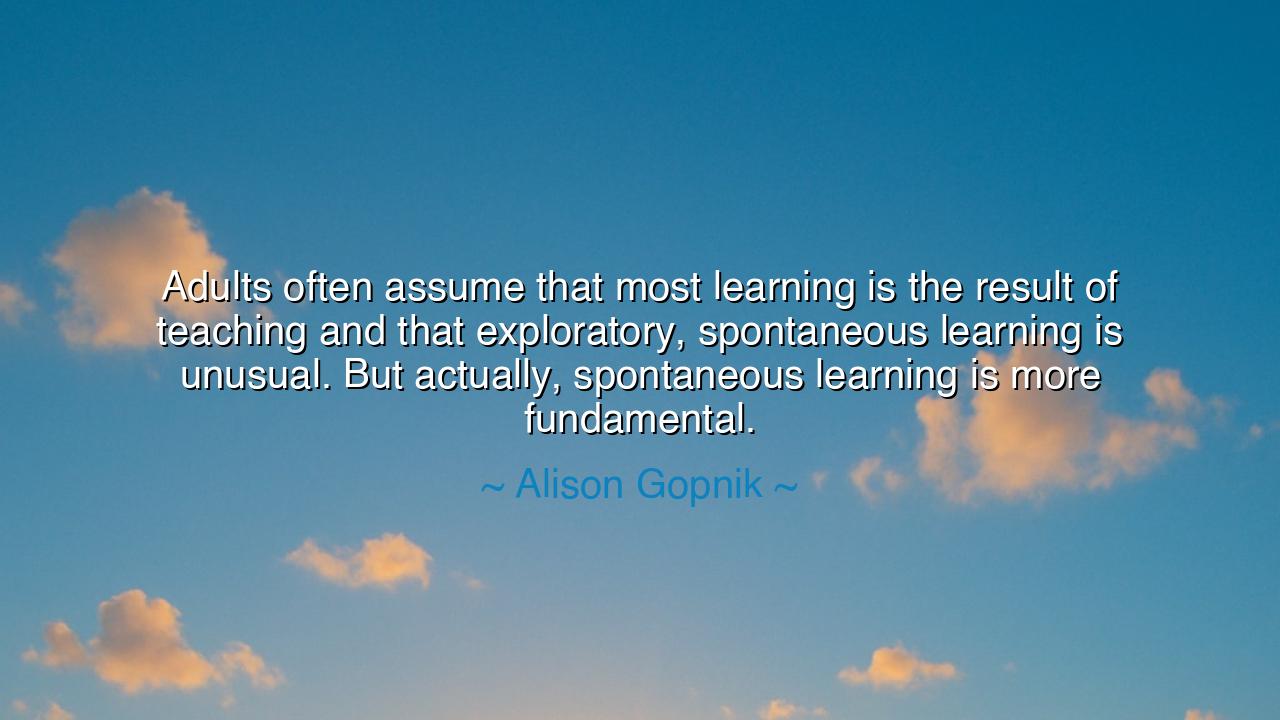
Adults often assume that most learning is the result of teaching
Adults often assume that most learning is the result of teaching and that exploratory, spontaneous learning is unusual. But actually, spontaneous learning is more fundamental.






“Adults often assume that most learning is the result of teaching and that exploratory, spontaneous learning is unusual. But actually, spontaneous learning is more fundamental.” — Alison Gopnik
In this profound reflection, Alison Gopnik, the wise scholar of the mind and child development, reveals a truth as old as humankind itself — that learning is not a mechanical act imposed from without, but a living flame that springs forth from within. Her words remind us that the mind’s first impulse is to wonder, to seek, to explore, to make sense of the world without instruction or permission. Before there were classrooms or teachers, there was the child — wide-eyed, curious, touching the earth, gazing at the stars, tasting and testing every mystery that life placed before them. Gopnik reminds us that spontaneous learning, born from the soul’s natural thirst for understanding, is not a rarity but the very foundation of human growth.
The origin of this wisdom lies in the field of developmental science, but its echoes stretch far beyond it. Gopnik, through her study of children, discovered that they are not empty vessels waiting to be filled with adult knowledge — they are natural philosophers, experimenting ceaselessly with the materials of the world. In their play, their questions, their mistakes, they embody the purest form of learning: learning that flows from curiosity, not command. Her insight is a challenge to modern civilization, which too often mistakes instruction for wisdom and confuses obedience with understanding. For the ancients, as for Gopnik, true learning was never about memorization — it was about awakening the innate intelligence that already lives within.
The ancient Greeks would have nodded in agreement. Socrates, that eternal teacher, never lectured — he questioned. He believed that knowledge was not a thing given by the teacher, but a truth drawn out from the student, like water from a hidden spring. His method was not teaching in the modern sense, but provocation — stirring the mind to remember what it already knows. Likewise, Plato compared learning to recollection, the soul’s remembrance of truths it once held before birth. These philosophers understood what Gopnik has reawakened in our time: that exploration, curiosity, and self-driven discovery are not childish detours, but the very essence of wisdom.
Consider the story of Isaac Newton, that quiet, curious boy who once sat beneath an apple tree and wondered why the fruit fell downward, not upward or sideways. No one told him to ask that question; no teacher instructed him to think of gravity. It was spontaneous learning, born of his own wonder, that led to one of the greatest revelations in human history. The lesson is clear: curiosity, not coercion, is the mother of genius. Newton was not unique in his capacity to learn without instruction — he merely preserved what most lose as they grow older: the freedom to explore without fear.
Gopnik’s words also carry a quiet rebuke to our modern systems of education, which too often silence this instinct. Children, born explorers, are confined to narrow paths; their questions are replaced by answers, their discoveries by assignments. Yet, the truest teacher is not the one who tells a child what to think, but the one who invites them to wonder. The flame of spontaneous learning flickers within every human being — yet adults, dulled by routine and the illusion of knowledge, often forget to nurture it. The child’s curiosity becomes the forgotten homeland of the human spirit, a place we must learn to return to if we wish to remain alive in mind and soul.
To learn spontaneously is to trust the natural rhythm of discovery — to believe that the mind, when left free, will seek truth as instinctively as the plant seeks light. It is not chaos; it is creation. Every great artist, scientist, or leader has drawn from this well of inward exploration. Leonardo da Vinci, endlessly sketching the wings of birds and the folds of rivers, did not wait for a teacher’s command. His learning was self-born, driven by awe and by the ceaseless urge to understand the divine order hidden within the world. In this sense, spontaneous learning is not the exception — it is the law of greatness itself.
So, dear seeker, let this wisdom be a mirror to your life. Do not let learning become a cage of rules and repetition. Let curiosity lead you, as it once did when you were young. Ask questions that have no clear answers. Look deeply at the world and let it teach you in silence — through observation, through trial, through joy and error alike. When you teach others, do not extinguish their spark with your certainty; instead, fan their flame with wonder. For as Alison Gopnik reminds us, the truest learning does not begin in the classroom, but in the soul — in that sacred space where the mind reaches outward, and life itself becomes the greatest teacher of all.






AAdministratorAdministrator
Welcome, honored guests. Please leave a comment, we will respond soon